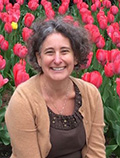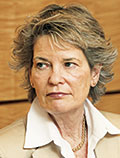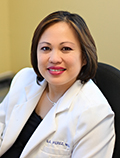Click here to view video testimony on The Barriers Facing Parents in Medicine
When women clinicians and researchers acknowledge the institutional factors that can make medicine an inhospitable profession for mothers, it is sometimes reluctantly. “The Association of Women Surgeons hosted an event on work-life balance. At first,
my reaction was, ‘Does that have to be the topic?’ This question is only brought to women,” says Laurie Schleimer, a student at Harvard Medical School. “But I saw there is value in having these conversations, such as what it’s like to be pregnant
while operating. Being a surgeon and a mother is not easy.”
Increasingly, researchers are highlighting pay gaps and promotion gaps affecting women in medicine, and are looking for the contributing factors.

The barriers facing parents in medicine are recognized but unsolved, says Dr. Margee Louisias.
Photo by Craig LaPlante/Harvard T.H. Chan School of Public Health
“Is medicine becoming more accessible to women? In terms of solutions, no. In recognition of the problems, yes,” says Dr. Margee Louisias, associate physician at Brigham and Women’s Hospital and an instructor at Harvard Medical School.
For some women, the difficulties begin with a conflict between the medical training timeline and their own biology. “Unfortunately, residency training is not designed to be a supportive environment for women to have children,” says Megan Evans, MD, MPH,
an OB-GYN at Tufts Medical Center and assistant professor at Tufts University School of Medicine. “Women who choose to have children during their residencies can often take only three to six weeks of maternity leave at most, often forfeiting vacation
time for the remainder of the year. This limited maternity leave played a significant role in my choice to wait to have children until after my training was complete, although waiting comes with its own challenges, including being older or 'advanced
maternal age,' which can increase risks for a number of conditions-both fetal and maternal.” Several women physicians interviewed by Vital Signs noted the irony of promoting breastfeeding to patients while facing daunting workplace obstacles
to doing it themselves.
Other barriers to advancement for parents of young children may include research awards that require the bulk of the principal investigator’s time. “Why can’t that first award be collaborative? What if two of us put the proposal together?” says Dr. Louisias.
Some opportunities could be made more accessible simply by offering daycare. Dr. Louisias passed up a valuable two-week training in another city, and shared her frustration with her mentor. “She said she couldn’t have done it, either. Hearing that from
her, a professor who’s excelled in her career, I realized this is not even a problem just for young women; it’s at all levels. If they’d offered daycare it would have been easy.”
Ways
to think about work-life tension
Vital Signs talked with women physicians
about how they are making it work.
How to think about work-life tension: Sequence your career
 “This is an idea that hasn’t penetrated the medical world as well as it has the
business world. It’s about paying close attention to the different phases in your life and building your career around them. These phases are often (but not always) driven by life-cycle events, such as parenting or aging parents. Your career can be
guided by your home needs, including periods when you work part-time or explore alternative schedules. It’s okay to do things for five-year periods. You’re not going to lose your opportunities by sequencing your career.”
“This is an idea that hasn’t penetrated the medical world as well as it has the
business world. It’s about paying close attention to the different phases in your life and building your career around them. These phases are often (but not always) driven by life-cycle events, such as parenting or aging parents. Your career can be
guided by your home needs, including periods when you work part-time or explore alternative schedules. It’s okay to do things for five-year periods. You’re not going to lose your opportunities by sequencing your career.”
—Lauren
Meade, MD, FACP; director of clinical learning and development at Sound Physicians; associate professor of medicine at Tufts University School of Medicine
Identify the modifiable stress points
 “Throughout my career I made strategic choices to ensure I never had to put myself into the situation of
choosing between equal priorities. I loved patient care but when my children were young I knew I could not invest myself to the extent necessary with patients in oncology. So, I began helping the administrators navigate how to right-size the budget
while delivering the care patients needed, and I moved into lab medicine with modified hours, taking calls from home. I lived one mile from [the] hospital and could be home by 4:00 every day. Later, I turned down a big job because I knew I would have
many moments of feeling torn between my kids and the hospital. I never regretted that. My kids grew up, the teen issues went away, and lots of opportunities came my way. I often speak to younger physicians about this. One was going through a divorce,
had two young kids, and was commuting to Boston. I said, ‘There are wonderful apartments in Coolidge Corner, within walking distance of the hospital. The art of the compromise is alive and well. Look at the stress points in your life and how you can
modify them.’”
“Throughout my career I made strategic choices to ensure I never had to put myself into the situation of
choosing between equal priorities. I loved patient care but when my children were young I knew I could not invest myself to the extent necessary with patients in oncology. So, I began helping the administrators navigate how to right-size the budget
while delivering the care patients needed, and I moved into lab medicine with modified hours, taking calls from home. I lived one mile from [the] hospital and could be home by 4:00 every day. Later, I turned down a big job because I knew I would have
many moments of feeling torn between my kids and the hospital. I never regretted that. My kids grew up, the teen issues went away, and lots of opportunities came my way. I often speak to younger physicians about this. One was going through a divorce,
had two young kids, and was commuting to Boston. I said, ‘There are wonderful apartments in Coolidge Corner, within walking distance of the hospital. The art of the compromise is alive and well. Look at the stress points in your life and how you can
modify them.’”
—Justine Carr, MD; former chief medical officer of the Steward Health Care System; former chair of the National Committee on Vital and Health Statistics
Appreciate the value of your work to your family
 “My mentor said, ‘What you have to remember is the value you bring to your children from modeling that you can
be a professional, what impact you can have on this world, the work that you’re doing. In the end, that’s going to trump any lousy feelings you may have in that moment.’ That was such great advice and put things in perspective. My husband and I have
told our kids that while we can’t both be there for everything, for all the major things in their life, at least one of us will be there. It’s helped my kids understand that their world isn’t just them but how they fit into this family unit and what
it takes to keep things going. It’s created this understanding that there has to be flexibility in anything we plan.”
“My mentor said, ‘What you have to remember is the value you bring to your children from modeling that you can
be a professional, what impact you can have on this world, the work that you’re doing. In the end, that’s going to trump any lousy feelings you may have in that moment.’ That was such great advice and put things in perspective. My husband and I have
told our kids that while we can’t both be there for everything, for all the major things in their life, at least one of us will be there. It’s helped my kids understand that their world isn’t just them but how they fit into this family unit and what
it takes to keep things going. It’s created this understanding that there has to be flexibility in anything we plan.”
—Holly Oh, MD; chief medical officer and director of quality improvement at The Dimock Center, Roxbury
Take control of your schedule
 “Balance is a bit of a myth. We need to be honest about that. You can’t be academically productive without
working at night; I don’t know anyone who is. But our professional lives are long, and to some degree we can control the pace. Choose the structure of your day. I chose research partly to be more flexible. I can be at home in the morning; I can take
a Monday off and work on my paper at night. I made the choice to be home at night, with my children, until 8.30, and not touch work until after that. I have a senior colleague who goes to McDonalds on Saturday before her kids are up and puts in four
hours.”
“Balance is a bit of a myth. We need to be honest about that. You can’t be academically productive without
working at night; I don’t know anyone who is. But our professional lives are long, and to some degree we can control the pace. Choose the structure of your day. I chose research partly to be more flexible. I can be at home in the morning; I can take
a Monday off and work on my paper at night. I made the choice to be home at night, with my children, until 8.30, and not touch work until after that. I have a senior colleague who goes to McDonalds on Saturday before her kids are up and puts in four
hours.”
—Kelly Irwin, MD; founding director of the Collaborative Care and Community Engagement Program, Massachusetts General Hospital; psychiatrist at Mass General Center for Psychiatric Oncology and Behavioral Sciences; recipient of the MGH
“one hundred” award, 2017
Build a supportive
team
 “It would be impossible to keep my practice running without the support of the people I work
with. I've learned the importance of teamwork and communication. In the morning, my assistant and I go over my schedule and plan the rest of the day so that I am able to complete all my charts and tasks before I leave. It’s the same at home. My nanny
knows our family's schedule very well, and she is able to make quick decisions if I’m not available. Surrounding myself with people I really trust has made it possible for me to balance life at work and at home.”
“It would be impossible to keep my practice running without the support of the people I work
with. I've learned the importance of teamwork and communication. In the morning, my assistant and I go over my schedule and plan the rest of the day so that I am able to complete all my charts and tasks before I leave. It’s the same at home. My nanny
knows our family's schedule very well, and she is able to make quick decisions if I’m not available. Surrounding myself with people I really trust has made it possible for me to balance life at work and at home.”
—Grace Perez-Lirio, MD; primary care physician in Needham Heights; medical director of the After Hours Clinic at Beth Israel Deaconess Needham Hospital; president of the Philippine Medical Association of New England
